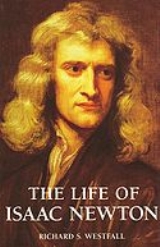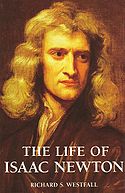
Richard S. Westfall
Encyclopedia
Richard S. Westfall was an American
academic, biographer
and historian of science. He is best known for his biography of Isaac Newton
and his work on the scientific revolution
of the 17th century.
, Westfall graduated from high school in 1942 and enrolled at Yale University
. His time at Yale was interrupted by two years of service in World War II
, but he returned to complete his B.A.
degree in 1948. He subsequently earned M.A.
and Ph.D.
degrees from Yale, with a dissertation entitled Science and Religion in Seventeenth Century England. The work was an early example of his lifelong interest in the history of science
and its relationship to religion
.
Westfall taught history at various universities in the 1950s and 1960s: California Institute of Technology
(1952–53), State University of Iowa (1953–57), and Grinnell College
(1957–63). He began teaching at Indiana University
in 1963 and worked his way up the faculty ranks until his retirement in 1989 as Distinguished Professor Emeritus. He died in 1996 at the age of 72.
 In 1980 Westfall published what is widely regarded as the definitive biography of Isaac Newton, Never at Rest. Westfall considered Newton a driven, neurotic, often humorless and vengeful individual. Despite these personal faults, Westfall ranked Newton as the most important man in the history of western Europe
In 1980 Westfall published what is widely regarded as the definitive biography of Isaac Newton, Never at Rest. Westfall considered Newton a driven, neurotic, often humorless and vengeful individual. Despite these personal faults, Westfall ranked Newton as the most important man in the history of western Europe
an civilization. Westfall published a condensed and simplified version of the biography as The Life of Isaac Newton in 1993.
Westfall published other books on the history of science, including The Construction of Modern Science: Mechanism and Mechanics (1971), Force in Newton's Physics: the Science of Dynamics in the Seventeenth Century (1971), and Essays on the Trial of Galileo (1989). Late in life he constructed a database
of information on the lives and careers of more than 600 scientists of the early modern era, his Catalog of the Scientific Community in the 16th and 17th Centuries, which he made available to other researchers.
and the Royal Society of Literature
, and the Sarton Medal
of the History of Science Society
. His Never at Rest earned the History of Science Society's Pfizer Award in 1983 as the best book in the history of science and the American Historical Association's Leo Gershoy Award in 1982 as the most outstanding work published in English on any aspect of seventeenth- and eighteenth-century European history. He also received the History of Science Society's Pfizer Award in 1972 for his Force in Newton's Physics and the society's Derek Price Prize in 1987 for his article, "Scientific Patronage: Galileo and the Telescope."
United States
The United States of America is a federal constitutional republic comprising fifty states and a federal district...
academic, biographer
Biography
A biography is a detailed description or account of someone's life. More than a list of basic facts , biography also portrays the subject's experience of those events...
and historian of science. He is best known for his biography of Isaac Newton
Isaac Newton
Sir Isaac Newton PRS was an English physicist, mathematician, astronomer, natural philosopher, alchemist, and theologian, who has been "considered by many to be the greatest and most influential scientist who ever lived."...
and his work on the scientific revolution
Scientific revolution
The Scientific Revolution is an era associated primarily with the 16th and 17th centuries during which new ideas and knowledge in physics, astronomy, biology, medicine and chemistry transformed medieval and ancient views of nature and laid the foundations for modern science...
of the 17th century.
Life
Born in Fort Collins, ColoradoFort Collins, Colorado
Fort Collins is a Home Rule Municipality situated on the Cache La Poudre River along the Colorado Front Range, and is the county seat and most populous city of Larimer County, Colorado, United States. Fort Collins is located north of the Colorado State Capitol in Denver. With a 2010 census...
, Westfall graduated from high school in 1942 and enrolled at Yale University
Yale University
Yale University is a private, Ivy League university located in New Haven, Connecticut, United States. Founded in 1701 in the Colony of Connecticut, the university is the third-oldest institution of higher education in the United States...
. His time at Yale was interrupted by two years of service in World War II
World War II
World War II, or the Second World War , was a global conflict lasting from 1939 to 1945, involving most of the world's nations—including all of the great powers—eventually forming two opposing military alliances: the Allies and the Axis...
, but he returned to complete his B.A.
Bachelor of Arts
A Bachelor of Arts , from the Latin artium baccalaureus, is a bachelor's degree awarded for an undergraduate course or program in either the liberal arts, the sciences, or both...
degree in 1948. He subsequently earned M.A.
Master of Arts (postgraduate)
A Master of Arts from the Latin Magister Artium, is a type of Master's degree awarded by universities in many countries. The M.A. is usually contrasted with the M.S. or M.Sc. degrees...
and Ph.D.
Ph.D.
A Ph.D. is a Doctor of Philosophy, an academic degree.Ph.D. may also refer to:* Ph.D. , a 1980s British group*Piled Higher and Deeper, a web comic strip*PhD: Phantasy Degree, a Korean comic series* PhD Docbook renderer, an XML renderer...
degrees from Yale, with a dissertation entitled Science and Religion in Seventeenth Century England. The work was an early example of his lifelong interest in the history of science
Science
Science is a systematic enterprise that builds and organizes knowledge in the form of testable explanations and predictions about the universe...
and its relationship to religion
Religion
Religion is a collection of cultural systems, belief systems, and worldviews that establishes symbols that relate humanity to spirituality and, sometimes, to moral values. Many religions have narratives, symbols, traditions and sacred histories that are intended to give meaning to life or to...
.
Westfall taught history at various universities in the 1950s and 1960s: California Institute of Technology
California Institute of Technology
The California Institute of Technology is a private research university located in Pasadena, California, United States. Caltech has six academic divisions with strong emphases on science and engineering...
(1952–53), State University of Iowa (1953–57), and Grinnell College
Grinnell College
Grinnell College is a private liberal arts college in Grinnell, Iowa, U.S. known for its strong tradition of social activism. It was founded in 1846, when a group of pioneer New England Congregationalists established the Trustees of Iowa College....
(1957–63). He began teaching at Indiana University
Indiana University
Indiana University is a multi-campus public university system in the state of Indiana, United States. Indiana University has a combined student body of more than 100,000 students, including approximately 42,000 students enrolled at the Indiana University Bloomington campus and approximately 37,000...
in 1963 and worked his way up the faculty ranks until his retirement in 1989 as Distinguished Professor Emeritus. He died in 1996 at the age of 72.
Works

Western Europe
Western Europe is a loose term for the collection of countries in the western most region of the European continents, though this definition is context-dependent and carries cultural and political connotations. One definition describes Western Europe as a geographic entity—the region lying in the...
an civilization. Westfall published a condensed and simplified version of the biography as The Life of Isaac Newton in 1993.
Westfall published other books on the history of science, including The Construction of Modern Science: Mechanism and Mechanics (1971), Force in Newton's Physics: the Science of Dynamics in the Seventeenth Century (1971), and Essays on the Trial of Galileo (1989). Late in life he constructed a database
Database
A database is an organized collection of data for one or more purposes, usually in digital form. The data are typically organized to model relevant aspects of reality , in a way that supports processes requiring this information...
of information on the lives and careers of more than 600 scientists of the early modern era, his Catalog of the Scientific Community in the 16th and 17th Centuries, which he made available to other researchers.
Recognition and awards
Westfall received many awards, most notably election as a fellow of the American Academy of Arts and SciencesAmerican Academy of Arts and Sciences
The American Academy of Arts and Sciences is an independent policy research center that conducts multidisciplinary studies of complex and emerging problems. The Academy’s elected members are leaders in the academic disciplines, the arts, business, and public affairs.James Bowdoin, John Adams, and...
and the Royal Society of Literature
Royal Society of Literature
The Royal Society of Literature is the "senior literary organisation in Britain". It was founded in 1820 by George IV, in order to "reward literary merit and excite literary talent". The Society's first president was Thomas Burgess, who later became the Bishop of Salisbury...
, and the Sarton Medal
George Sarton Medal
The George Sarton Medal is the most prestigious award given by the History of Science Society. It has been awarded annually since 1955. It is awarded to an historian of science from the international community who became distinguished for "a lifetime of scholarly achievement" in the field...
of the History of Science Society
History of Science Society
The History of Science Society is the primary professional society for the academic study of the history of science.It was founded in 1924 by George Sarton and Lawrence Joseph Henderson, primarily to support the publication of Isis, a journal of the history of science Sarton had started in 1912....
. His Never at Rest earned the History of Science Society's Pfizer Award in 1983 as the best book in the history of science and the American Historical Association's Leo Gershoy Award in 1982 as the most outstanding work published in English on any aspect of seventeenth- and eighteenth-century European history. He also received the History of Science Society's Pfizer Award in 1972 for his Force in Newton's Physics and the society's Derek Price Prize in 1987 for his article, "Scientific Patronage: Galileo and the Telescope."

